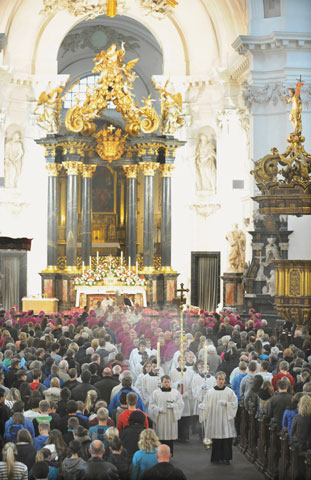
The German bishops celebrate Mass Sept. 29 in the cathedral in Fulda at the opening of their plenary. (Newscom/Imago stock&people)
German Catholics won't be praying from a new translation of the Roman Missal this Advent as planned, the German Bishops' Conference has announced. In fact, the conference has postponed the introduction of the new Mass prayers indefinitely.
The bishops' conference had been expected to approve the new translation at their plenary in September. Instead, they pronounced the work of the translation team complete and noted that because "a need for greater clarification" of the translation arose from German, Austrian and Swiss bishops, the next steps in the process "lie now in the competence of the bishops' conferences responsible for the final publication."
"At the present time there is no further information on the time frame" for final publication, the bishops' conference noted.
To explain what this means, the German publication Christ in der Gegenwart ("Today's Christian") commented: "One would seek in vain in the official press release ... for the sentence, 'The new translation of the Roman Missal must be considered collapsed.' But the dry, convoluted sentences [of the official announcement] ... could not mean anything else but this."
There will be no new translation this Advent, "nor will it be coming about in the foreseeable future," said Christ in der Gegenwart.
The liturgy blog Pray Tell has been following the translation issue. That blog reported that the German-speaking bishops have been unhappy with the translation process since 2009, echoing many of the criticisms of the English translation of the Roman Missal, which went into effect two years ago. Pray Tell said the German-speaking bishops "were fundamentally opposed to language in the liturgy which is not the language of people, and opposed to the literalism demanded by Rome. Instead of merely translating Latin words, they wanted the sense and meaning of the Latin to be expressed within the possibilities of the German language. It was felt that the new translation is stylistically inferior to the current one."
Advent in Germany, however, won't go smoothly.
A new edition of the official German hymnbook known as the "Gotteslob" ("Praise to God"), which also carries the Mass prayers, was to have come out on the first Sunday of Advent. The new edition reprints the new translation of the Mass prayers, including Eucharistic Prayer II, that the German bishops have not approved.
A further difficulty has cropped up: The 3.6 million hymnbooks, each of which has more than 1,200 pages, are being printed on special fine paper by C.H. Beck in Munich, a 250-year-old firm renowned of its speciality in fine paper editions. The first batch of hymnbooks proved satisfactory but then the printer ran out of the fine paper and used paper that was so thin that the print bled through onto the next page, making it illegible.
This second batch of hymnbooks has had to be pulped, which means that at least nine German dioceses, including Cologne, Munich and Regensburg, will now not receive their new copies until the spring of 2014.
[Christa Pongratz-Lippitt is the Austrian correspondent for the London Catholic weekly The Tablet.]




